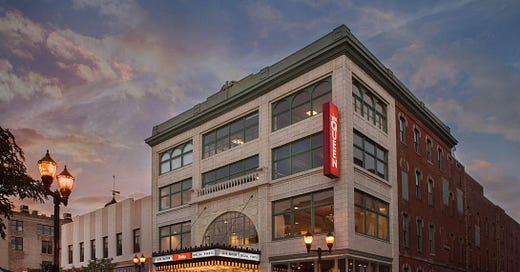06/26/2024: Election Scheduled at The Queen in Wilmington, DE
Also, a default judgment against a company that violated a settlement agreement.
American Backflow & Fire Prevention, Inc., 373 NLRB No. 71, 13-CA-288185 (Published Board Decision)
This case involves a default judgment motion by the General Counsel (GC) against American Backflow & Fire Prevention, Inc. (Respondent) for breaching a settlement agreement with Plumbers Local 130 (Union). The settlement agreement, approved by the Regional Director, outlined various remedial actions the Respondent was obligated to take, including recognizing the Union as the exclusive bargaining representative and engaging in good faith bargaining.
Legal Analysis
Default Judgment and Settlement Agreement: The GC argued that the Respondent breached the agreement by unlawfully withdrawing recognition of the Union and cancelling all scheduled bargaining sessions. The Respondent admitted these actions in its amended answer to a consolidated complaint, but argued that it had objective evidence of the Union's loss of majority support.
Burden of Proof: The GC argued that the Respondent had the burden of proving objective evidence of the Union's loss of majority support to justify withdrawing recognition. This is based on the principle established in Levitz Furniture Co. of the Pacific, 333 NLRB 717, 725 (2001), which holds that an employer can only withdraw recognition if there is objective evidence that the union no longer has majority support.
Respondent's Failure to Prove Loss of Majority Support: The Respondent did not present any evidence to support its claim of a loss of majority support, initially citing decertification petitions that were later deemed tainted by the Respondent's own unlawful conduct.
Violation of 8(a)(5) and (1): The Board, following the settlement agreement's provisions, concluded that the Respondent's withdrawal of recognition without objective evidence constituted a violation of Section 8(a)(5) and (1) of the National Labor Relations Act (NLRA).
Default Judgment Granted: The Board granted the GC's motion for default judgment, finding all the allegations in the complaint to be true. The Board reasoned that the Respondent had not provided any evidence to refute the GC's case and had not offered a legitimate basis for its actions.
BPG Live LLC d/b/a The Queen, 04-RC-340444 (Regional Election Decision)
BPG Live LLC operates a performing arts venue known as The Queen in Wilmington, Delaware. IATSE Local 8 filed a representation petition seeking to represent a unit of approximately 15 production employees, including audio, video, and lighting technicians, as well as stagehands.
Legal Analysis
Jurisdiction: The NLRB’s jurisdiction extends to employers engaged in interstate commerce. The Board found that BPG Live LLC met this requirement due to its business operations, which included hosting performances by out-of-state artists, selling tickets through Ticketmaster, and selling beverages manufactured out-of-state.
Appropriateness of the Unit: The petitioned-for unit included all full-time, regular part-time, and on-call production employees. The Board determined that these employees shared a community of interest due to their functional integration, shared supervision, similar terms and conditions of employment, and overlapping job functions.
Voter Eligibility Standard: Given the irregular employment patterns of the production employees, the Board applied a modified version of the Julliard eligibility formula. Employees who worked for a total of 5 days over a one-year period or 15 days over a two-year period were deemed eligible to vote.
Method of Election: The election was directed to be conducted via mail ballot due to the scattered and irregular work schedules of the production employees, ensuring that all eligible voters would have the opportunity to participate.
Key Cases
NLRB v. Fainblatt, 306 U.S. 601 (1939): The Supreme Court held that the NLRB's jurisdiction applies broadly to enterprises affecting interstate commerce.
Overnite Transportation Co., 322 NLRB 723 (1996): The Board considers factors like functional integration, common supervision, and similarities in terms and conditions of employment to determine if a petitioned-for unit is appropriate.
The Julliard School, 208 NLRB 153 (1974): Established eligibility criteria for part-time and on-call employees in the entertainment industry based on their sporadic work patterns.
San Diego Gas and Electric, 325 NLRB 1143 (1998): Regional Directors have discretion to direct mail-ballot elections when eligible voters' work schedules vary significantly.



